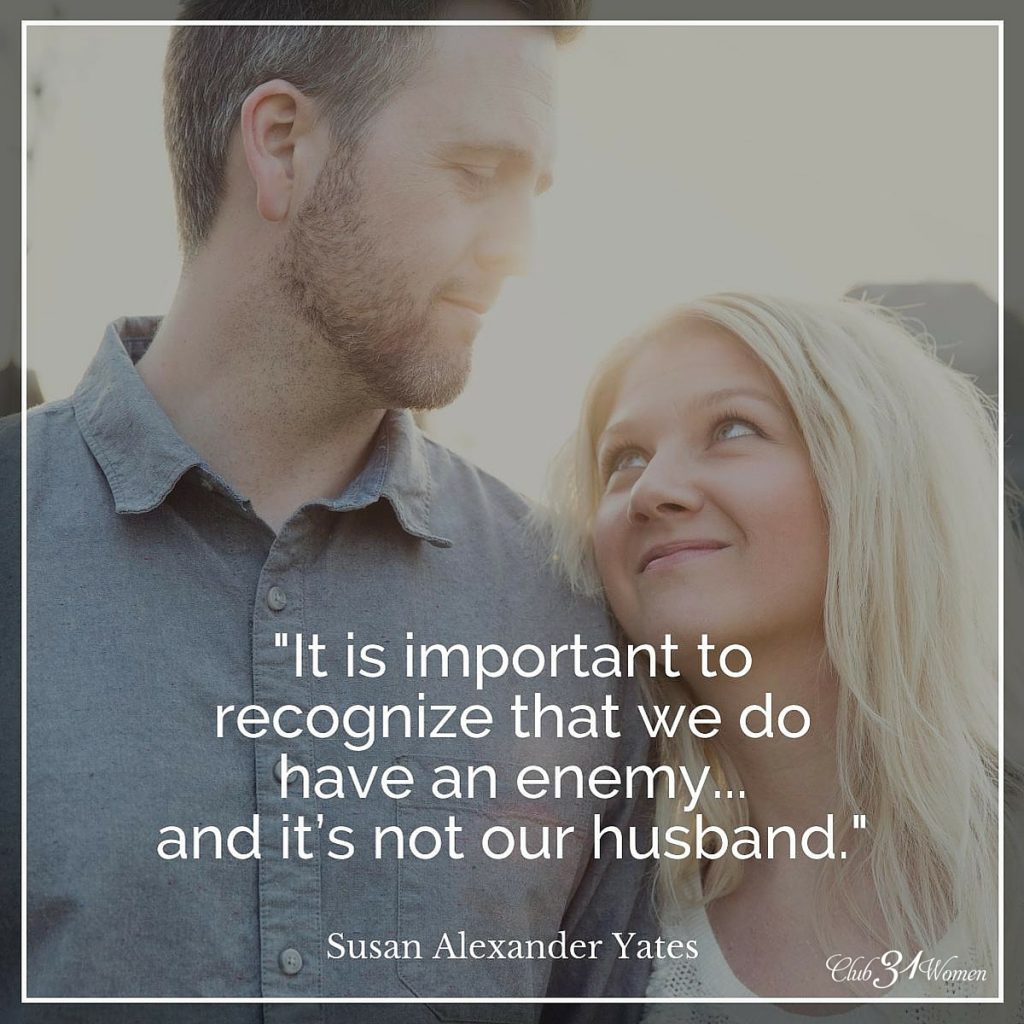8 Keys to Help Keep Our Kids from Pulling Us Apart
When I heard the front door open and his briefcase plop down on the floor . . .
I knew I should put the spaghetti sauce aside and go give him a big “welcome home” hug.
I could already hear the kids shouting, “Daddy’s home, Daddy’s home.”
But I just didn’t feel like it.
I was tired, bone tired.
Tired of being cooped up with five little kids (ages 2 to 9) all day.
Tired of his breezing in for dinner and out again to another meeting and leaving me to get five kids into bed.
And I was frustrated at our lack of communication.
It seemed like we were just passing in the night. Our conversation had resorted to the functional – what a particular child had done, who was going to pick up the dry cleaning, and “Oh, did you call your mother?”
We weren’t sharing they way we used to before life got so crazy with the kids. We just didn’t have time or energy. I felt resentful. I seemed to be drifting apart from him, and it scared me.
“Help Lord,” I said as I put down the sauce to go greet him. “This is not the way it is supposed to be. We love our kids, but we need time for us too. Please show me how we can grow closer instead of pulling apart. Give me the energy and the will to make changes even when I don’t want to!”
We all love our kids, yet we want to and need to continue to grow in our marriage. How do we do this in the midst of raising kids plus handling everything else that is on our plates?
Here are eight keys to help us keep our kids from pulling us apart.
1. Recognize the tendency to drift
Our tendency is to think, “I’ll work on my marriage when life calms down.” But life doesn’t calm down, especially with children. It only gets more complicated.
We think our life is crazy when we are changing diapers all day, breaking up another fight between 2 siblings, and trying to figure out what to do with a child who whines all the time. Finally, night comes and we fall into bed only to be awakened by a 2-year-old who won’t stay in his own bed. Morning comes, and it begins all over again.
We try to have a meaningful conversation with our husband, but we are just too tired. It’ll be better when they are older we reason, but then they hit those active years and our life is consumed with soccer games, homework, carpooling, volunteering, and for some, work outside the home.
Once again we seem to be passing in the night, living in the same house with our husband but not really connecting at a deep level.
As we approach the teen years, we become fearful. Our child raising philosophies seem to clash. Hormone swings seem to dictate the atmosphere in our home. And lovemaking becomes rarer and less fulfilling. After all the kids are up later than we are! (And it’s hard to focus when we lock our door and try to be quiet! We imagine they know what we’re doing!)
And then the empty nest begins. When the last child leaves, we might wonder, what do my husband and I have in common besides the kids? Our whole marriage seems to have focused on them. But now, what about us? Is there still an “us”?
Our tendency in every season of parenting is going to be to drift apart, to let the children take over.
We may not even realize what’s happening. It’s so subtle. But that’s bad for our kids and for us. Ordinarily, we have our child for approximately 18 years. God willing we have our husbands for a lifetime.
It’s important to keep our relationship with our mate as our first priority.
Our child’s security is increased when he knows that our marriage relationship comes first. He comes second. And we are raising future husbands and wives who will have to make their own marriages a priority.
How will they learn this if it is not modeled in the home?
2. Don’t place blame
It was all too easy for me to blame my husband for our lack of communication.
After all, it didn’t seem to bother him that we weren’t talking the way we use to. However, it did bother me. So I asked him to set aside some time a couple of days later to talk together.
Over the years, I have learned to remember that my husband is not my enemy. We are on the same team. It does no good to blame him. Whatever the issue is, it’s our problem together.
It is best to focus on the problem, not the person.
In this instance, we recognized that we needed daily time to visit and the kids needed to know that Mom and Dad’s relationship came first.
So we decided that when he first got home from work, we’d have a cup of tea together and visit for 20 minutes.
Then he played with them while I got dinner ready.
We told the kids they could be in the room but not speak. It was our “tea time.”
The first night they all gathered around us and tried to monopolize things, and we had to be firm and tell them not to speak. When they realized we meant it, they quickly became bored and left us alone.
It was our time to try to go a little deeper. I learned to ask questions that call for more than a one-word answer—questions like, “What is something that happened today that made you feel satisfied? Is there someone you are concerned about? How are you feeling about yourself? If we had unlimited funds, perfect childcare, and three days of vacation what would you want to do?”
We didn’t ask the same questions each day.
At first, these questions seemed awkward, especially for John. When I asked him how he was feeling about himself, he responded, “Why I don’t feel, I just do my job.” However, the more we talked, the more he realized he did have feelings.
Our “tea talks” gave us a little bit of time each day- without kids – in which we tried to get beyond facts to deeper levels.
This one small step increased our sense of intimacy.
In raising kids, we are going to face issues that impact our marriages.
In this instance, the issue for me was our lack of time to talk deeply with so many kids. It’s helpful to keep “the issue” the focus (communication, discipline approaches, financial matters, etc.) and not our spouse. Put the issue on the table and creatively brainstorm problem-solving options.
3. Recognize the enemy
Our issue may be something simple like communication.But sometimes we seem to go after one another without thinking, and we say and do things we later regret.
It is important to recognize that we do have an enemy, and it’s not our husband.
It’s Satan. Either we don’t take him seriously enough, or we focus on him too much. Realize that he is real, and he would love to destroy our marriages. He is also subtle, and too often we don’t recognize his ways.
Perhaps you’d had a bad day dealing with a difficult teen. You are tired, frustrated, and feel like a failure. Your husband comes in and you immediately jump on him. Soon you find yourselves in an argument that seems to have come out of nowhere.
It’s time to call a halt and recognize that the enemy is trying to get a foothold.
Simply stop, put your arms around each other, ask God to ban Satan from you relationship and to give you grace to work through this issue together.
God’s word says to resist the devil and he will flee from you. (James 4:7&8).
4. Tackle difficult issues
Jay and Sally have two preteens. For years, Sally’s philosophy of discipline has been to placate their sons. She is hesitant to discipline them and is far more likely to be lenient than to precipitate a confrontation.
Jay, on the other hand, believes in firm discipline, clearly defined rules, and swift punishment for infractions.
While Sally often lets the boys get away with things she should not, Jay errs on the side of too many rules. Their different approaches to discipline have caused much dissension in their marriage. And as the boys go to High School the tension is only going to increase.
Different approaches to parenting need to be faced and worked out or they will divide the parents and cause insecurity on the part of the kids.
If you and your husband disagree over how to discipline your kids or other issues, you need to tackle the problem head on. Seek out a godly older couple who has raised their kids. Ask them to meet with you, to advise you and to pray for you. If necessary, seek out a professional counselor who specializes in parent-child issues.
When you come from different backgrounds yourselves, your tendency will be to approach parenting very differently. You will need to come to an agreement on how you will operate together or your kids will come between you.
Occasionally it will be helpful to write out your policy.
Sit down together – just the two of you – and determine what your curfews will be for each child in this season. What will the punishment be if the child is late, the first time, the second? Write it out for the two of you. You can do this with TV, the internet, movies, etc.
An Example
For example, teens rarely plan ahead. It’s easy for them to come in on Friday afternoon and say,“Hey Mom, can I go to see “such & such” movie tonight? Everyone’s going and I need to know right now!” After a couple of disasters in which I said “no” and he said “yes” and we got mad at each other and the kids, we made some changes.
John and I realized we were letting the kids cause friction between us and everyone was miserable.
So, the two of us decided that our movie policy would be: our teens don’t see movies that are rated stronger than PG unless we’ve seen it and feel it’s ok, or another adult who has the same values has seen it first and ok’d it. (We loosened up in their senior year.)
When the request came with “I have to know right now.” We responded, “If you need to know right now the answer is ‘no’, but if you are willing to wait until I can talk to your father (or another adult) then you might get an answer you like better.” We cannot be held hostage by the “having to know right now!”
As a result, you will need to make changes in your policies as your kids grow, but writing it out will force you to come to agreement together rather than letting the kids pull you apart.
Most of us work or have worked in the market place where we had differing opinions represented. We have to hear each other out and then agree upon a policy. These same market-place problem–solving skills can be used in the family. When you think in this way, marital tension is likely to be less.
5. Take time away together.
Before we were married a wise couple challenged us, “Make a commitment now to go on a weekly date alone.” Do it for the rest of your life. We took their advice, and it has made a big difference in our marriage, especially when the children began to come along.
It hasn’t always been an evening. Sometimes it’s been breakfast, or when the kids were in school, a luncheon. And we haven’t made it every week. Yes, emergencies come up but throughout our marriage, we’ve made it 60% of the time.
If we hadn’t put it on the calendar every week, it would have been much less.
When our kids were young, we use to trade babysitting with another couple twice a year for a weekend getaway. We kept their kids; then they kept ours. Once we had five kids, it was harder to find anyone who wanted to trade!
But I learned the value of a few nights away alone to nurture our marriage.
On one occasion I was exhausted, and we had not had any time alone in a while so we got a babysitter to come to our house and went to a motel one mile away so we could have dinner and a night alone. I had to take a nursing baby along, but at least they don’t talk! Finally, the two of us were able to speak in complete sentences!
My friend Ellen has a husband who travels. It can be hard when he comes home from a long trip to re-connect as a couple when the children want and need to see their Dad. So often Ellen will arrange for child care, meet her husband upon arrival, and go to a hotel for 24 hours together before they go home.
This gives them a chance to re-connect, and it doesn’t hurt the kids to wait one more day to see Dad. It also models for them the importance of spending time with your mate.
As women, we need to take initiative and to be creative.
Put little kids to bed early and plan a romantic picnic on the floor of a cozy room that has a lock on the door. Light candles and put on music. Dine in a skimpy nightgown. The atmosphere will have a positive impact on both of us! Kidnap your husband from work one day and go to a motel in the middle of the day. He may be shocked, but he’ll be pleased that you thought of it.
6. Give attention to the little things.
When our daughter Allison was a newlywed, I went to visit her and Will. I noticed how thoughtful she was of him. She asked him if he would like a cup of coffee. She fixed it for him. She made an effort to do things for him. As I watched, it dawned on me, “I used to do that too. Now, I just figure if he wants it he’ll get it himself.” With a shock, I realized that I had become lazy in being kind.
We have to guard against becoming lazy in thoughtfulness.
Your husband comes in from work, and you meet him in dirty clothes, no makeup, and a shirt with baby’s spit up on it – It’s your badge- It says, “I worked hard today too!” But wouldn’t it be better to put on a clean shirt, re-do your makeup and comb your hair? It communicates, “You are worth fixing up for.” (Remember, there are plenty of other women in the world who would fix up for this man!)
It’s so easy to become overwhelmed with the demands of our kids and our careers.
With all the pressures it’s natural to forget to think of him. Men need appreciation. They need affirmation.
They aren’t often as demanding as we are, but that doesn’t mean they don’t need care. Thank him today for something you take for granted. Tell him something you admire in him. You are training your daughters in how to be thoughtful wives!
After observing my daughter, I made a greater effort to ask John if I could fix him something to drink. I tried harder to cook things he liked, and I tried to become more aware of how to serve and honor him. I’m still working on it!
7. Have girlfriends.
Recently I joined ten other gals for a surprise slumber party for my friend Sue’s birthday. We did skits, we cooked, we laughed, we talked and talked. It was thoroughly invigorating. All that estrogen would have exhausted any man! Yet for us, it was pure encouragement.
Women need women. It makes us better wives.
Why?
Women understand one another.
When my kids were little, I quickly learned that I needed to be in a small group with other mothers of young children. It was all too easy for me to expect my husband to understand why I was feeling down from a long day of changing diapers, wiping noses, and breaking up sibling fights.
But sometimes he just couldn’t seem to understand or to appreciate me. I finalized realized that it was unrealistic to expect him to! He’s not a woman! What we need are other young moms who can say, “I know just how you feel. You are normal!”
Young moms need older moms with perspective to say, “You’re on the right track.” Or “You might try this…”
We need women who encourage us to grow in Christ and to move closer to our husbands. It’s dangerous to spend time with women who bash husbands. Instead, seek one or two women who will hold you accountable for growing in your walk with the Lord and loving your husband more.
Godly girlfriends will make you a better wife and mother.
Too often we look to our husbands to meet needs that would be better met by going to God first and then to some other women.
8. Practice Forgiveness.
The most important ingredient in the home is that of forgiveness. I can’t tell you how many times I’ve had to go to my husband and to my kids and say, “I shouldn’t have said (or done) what I did and I need to ask you to forgive me.”
I can’t remember a time when I felt like forgiving. Most of the time I’d rather tack on, “but if only you had or hadn’t…”.
I do not because I feel like it, but because God has called me to ask for forgiveness and to grant it. It can take time for feelings to be healed. But that healing can’t begin until I go and ask for forgiveness.
Our children are going to need to learn how to do this in their future marriages and with their own children. They will learn as they watch us. So in a sense, my children have a way of holding me accountable, of keeping me honest. More than anything I long for my kids to love Christ and to love their husband or wife.
So when I want to lash out at my husband, when I want to withdraw from him, when I want to blame him, I remember the kids. I know that more than anything they need two parents who love each other and who work through problems.
They need a mom is searching for little ways to strengthen communication. A mom who is seeking to show kindness even when she doesn’t feel like it. A mom who believes the best. And most of all, a mom who seeks God first.
Blessings,
Grab Susan’s free ebook, “Camp at Home,” right here. This valuable resource is based on her book Cousin Camp. It includes 100 things for you to do with your kids of different ages including toddlers, the middle years, teens, and specific things for the whole family. In addition, there are ideas for grandparents to use to stay connected with their grandkids.

A 52-Week Devotional for the Deeper, Richer Marriage You Desire
An intimate, loving marriage is so much closer than you think
Imagine if, at the end of the year, despite your busy schedules and all the demands on your time and attention, you and your husband were more in sync, more connected, and more in love than ever before. Sounds amazing, right?
That kind of marriage is what is waiting for you as you read through the fifty-two weekly devotions in Loving Your Husband Well. Each entry includes a specific theme, related Scripture, a powerful devotion, thoughts for further reflection, practical ideas, and a prayer, all designed to help you love, cherish, and serve the man who shares life’s journey with you.












